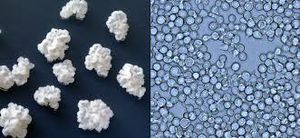Spoiler Alert: Zygosaccharomyces Rouxii and It's Role in Food Spoilage and Fermentation
Introduction

By Daniel Maffezzoli
Zygosaccharomyces rouxii is an interesting species of yeast that is infamous within the food industry. Its capacity to thrive in both highly saline and sugar-dense environments is what makes Z. rouxii a predominant food spoiling agent. The metabolism and ruggedness of the microbe also allow it to resist typical preservative methods in food production. In addition to being a spoiling agent, Z. rouxii is actually used to create various staple ingredients and traditions in East Asian cuisine. More specifically, Z. rouxii is the principal microbe used in the fermentation of soybeans during the brewing process of soy sauce, and in the production of miso. This page aims to provide detailed information on the unique metabolism and homeostatic tendencies of this microbe, how the microbe goes about spoiling foods, and the productive qualities that arise from the spoilage-inducing features – particularly in the context of brewing soy sauce.
Habitat, Physiology, and Metabolism
Include some current research, with at least one figure showing data.
Every point of information REQUIRES CITATION using the citation tool shown above.
Food Spoilage
Include some current research, with at least one figure showing data.
Soy Sauce Prodcution
Include some current research, with at least one figure showing data.
Conclusion
Supplemental Figures
References
Authored for BIOL 238 Microbiology, taught by Joan Slonczewski, 2017, Kenyon College.
